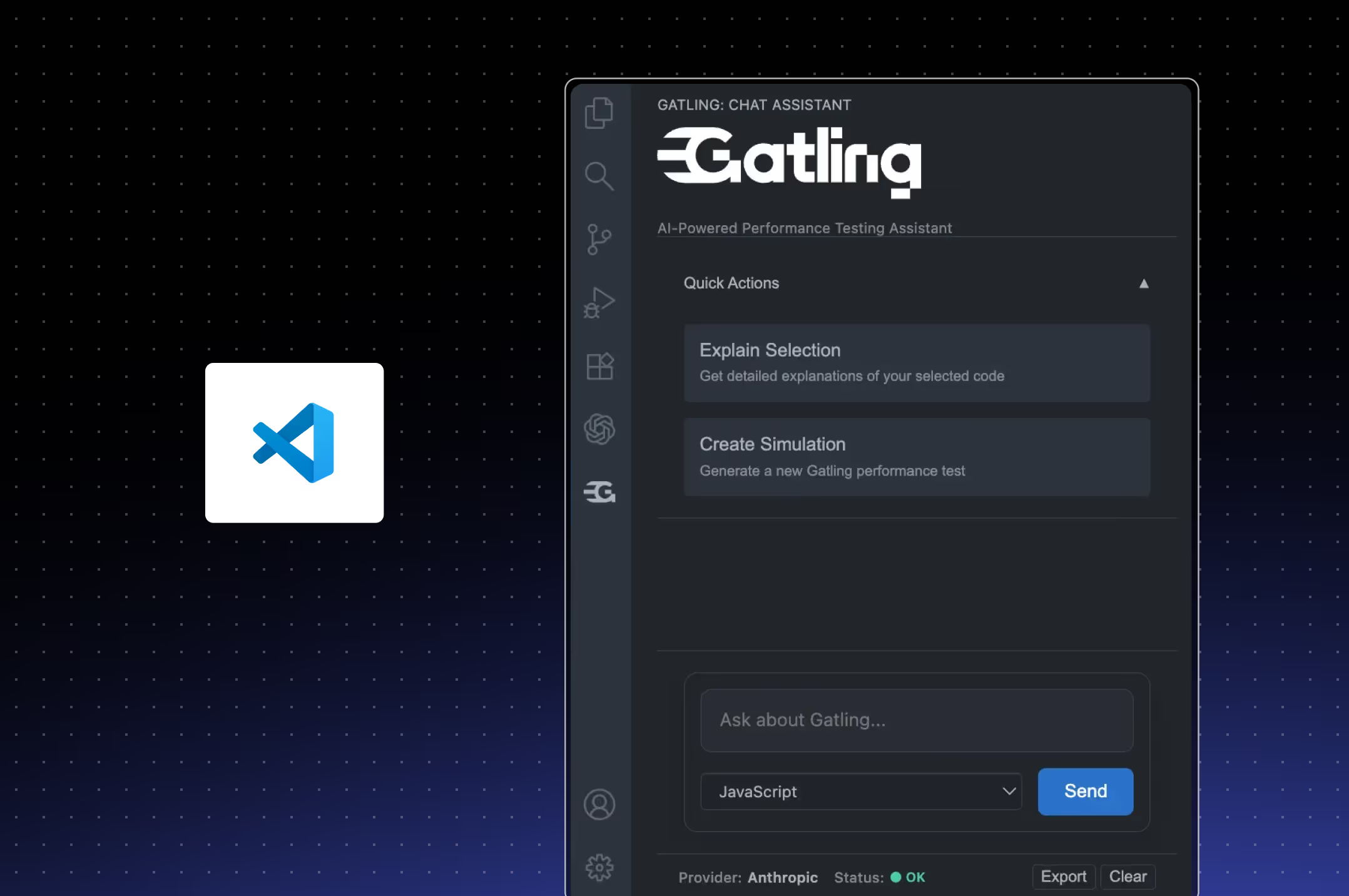Load testing for JavaScript developers
Write performance tests in the language you know best. Create realistic user journeys with familiar JavaScript syntax, npm packages, and your favorite IDE.
AI ASSISTANT FOR VS CODE
Accelerate test creation with AI
Our AI assistant helps you write, explain, and optimize Gatling tests directly in your IDE. Accelerate your performance testing workflow with AI-powered guidance for test-as-code. Now available on VS Code Marketplace.



Why JavaScript
for load testing?
Code and test in the same language
Your JavaScript developers write functional tests in JavaScript—now they can write load tests in the same language. No context switching, no learning new syntax. Simplify test creation and maintenance across your entire testing suite.
Include your QA team in load testing
JavaScript is a preferred language for QA testers. Use the Gatling JavaScript SDK to involve your QA team in performance testing. Closer collaboration between developers and testers shortens your development lifecycle.
Leverage the npm ecosystem
Creating realistic tests often means using existing packages and libraries. Import resources from npm to save time and build highly accurate tests with battle-tested JavaScript libraries.
INTERACTIVE DEMO
Load test JavaScript apps with confidence
Harness the power of Gatling’s high-performance engine with our native JS and TS SDK. Define complex user scenarios, validate SLAs, and scale your tests effortlessly; all in code, all in JS.
Developer
and QA-friendly tooling
The JavaScript SDK lets you create, run, and debug performance tests directly in your JavaScript projects, with full support for CI/CD integration and reusable test scripts.
Type definition support
Work more efficiently with typed libraries and reduce debugging time with full TypeScript support.
IDE syntax autocomplete
Get intelligent code completion and ensure you call the correct function names in your test scripts.
Local test execution
Debug and validate tests locally before deploying them to Gatling Enterprise for distributed execution.
Built-in debugging tools
Use breakpoints, step-through debugging, and error inspection just like any JavaScript application.
Strategic performance analytics
Infrastructure that scales with you
The best experience for every team
Built for simplicity and speed
Performance testing
Cross-team collaboration
Seamless load testing that speeds your SDLC
Handle complex test data
Load testing often requires handling vast quantities of test data, including data generated during the test and used in subsequent steps.
Import CSV files, generate dynamic payloads, handle authentication flows, and validate complex response structures—all with familiar JavaScript syntax and your favorite libraries.

Convert browser actions into test scripts
With the JavaScript SDK, you can use the Gatling Recorder to capture real browser interactions and automatically generate JavaScript load test scripts.
Start from real user interactions and generate clean, maintainable JavaScript code.

FAQ
Frequently asked questions about Gatling's JavaScript SDK
The JavaScript SDK and Gatling Enterprise Edition are perfectly integrated. After writing load tests in your local development environment, you can package and deploy the tests to the Gatling Enterprise platform through:
- The UI
- CLI commands
- Your CI/CD pipeline
The JavaScript SDK allows you to import libraries to speed up test development and write more realistic simulations. Because we rely on GraalVM to translate the tests to run on a Java Virtual Machine, we don’t have access to the Node.js SDK during runtime. This means libraries with a Node.js SDK dependency won’t work with the JavaScript SDK.
Work better,
release faster
Empower your teams to design, run, and analyze load tests together, without silos.
Your all-in-one load testing platform
Design complex tests, manage global infrastructure, and turn results into action on one powerful platform.
Need technical references and tutorials?
Minimal features, for local use only

